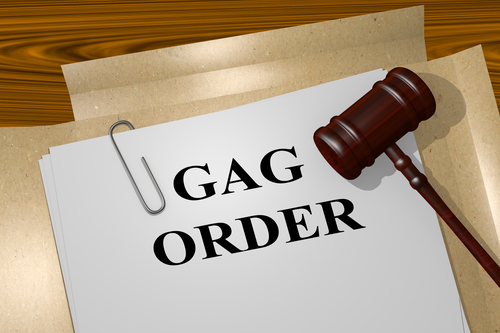Long-time Republican political operative, staunch Trump supporter, and self-described “dirty trickster” Roger Stone has never been one to hold his tongue in the face of controversy. Even in the wake of criminal indictment on five counts of making false statements, one count of obstructing an official proceeding, and one count of witness tampering,
he betrayed no sign of avoiding the spotlight.
In response to colorful public proclamations of his innocence, the federal judge hearing his case publicly admonished Mr. Stone to tone down his public statements. Then she officially issued a gag order against him and his attorneys.
In the course of all this, a picture of the judge was posted online next to an image on Instagram that looked like the crosshairs of a gun scope. Unsurprisingly, she was not amused. She ordered a hearing where he would have to explain himself or suffer further consequences.
It is certainly true that a courtroom is a presumptively open space. Americans have a First Amendment-based right to know what’s going on inside it and parties to a court action have a First Amendment right to speak their minds in court (with certain restrictions when a jury is present). However, Stone’s case presents questions about where freedoms of the First Amendment end and the authority of a court begins outside a courtroom, outside a courthouse, and in areas far removed from where a judge is the undisputed ruler of the space.
“I want to make it clear, from this point on, that I expect counsel to do their talking in this courtroom and in their pleadings, and not on the courthouse steps,” Judge Amy Berman Jackson stated. Attorneys, in exchange for the privilege of practicing law, voluntarily relinquish some degree of free speech, as the judge noted.
But can a judge really compel someone who is only accused, but not convicted, of a crime to squelch public statements? Doesn’t the First Amendment say, “Congress shall make no law” abridging the freedom of speech?
Let’s look at what’s at stake in the Roger Stone case.
Protection of a Right to Fair Trial
A “gag order” is a form of prior restraint prohibiting individuals from talking about, publishing, or disseminating information pertaining to a case in which they are directly – or indirectly – involved.
Gag orders are frequently sought by one party in a case. However, judges have the authority to issue them on their own initiative as well. They are often enforced in an effort to ensure fair trials.
Often, a defendant’s legal team requests a gag order to prevent prosecutors or law enforcement from making excessive statements about a defendant’s guilt. Also, defendants often ask to seal evidence from public distribution even though the evidence is public record. One concern is preventing the pool of potential jurors from forming opinions they cannot set aside at trial. But is that the concern in this case?
In this case, Special Counsel Robert Mueller’s team expressed support for the gag order, believing that allowing Stone to continue making broad public statements about his innocence would actually increase chances he would not have a fair trial. Evidence included interviews in which Stone discussed varying topics, including the merits of charges against him, the nature of evidence, and the credibility and motives of witnesses and the prosecution.
Sometimes the prosecution doesn’t challenge gag orders. By the time a defendant seeks a gag order, the prosecution and law enforcement have had their say publicly about why a defendant has been charged and why they believe the defendant is guilty.
The news media, however, have a right to challenge gag orders because they impinge on the First Amendment right of newsgathering.
Gag order opponents argue:
- Judges must carefully consider all alternatives to gag orders.
- Gag orders are too broad and should always be limited to specific information.
- In most cases, individuals should be allowed to speak or otherwise express themselves freely.
- Gag orders hinder the ability of the press to gather news information, which restricts the flow of it to the public, both of which are protected by the First Amendment.
In Roger Stone’s case:
- The entirety of the Mueller investigation is not only set on a national stage but a world stage. Judge Jackson would be hard-pressed to find members of the jury pool in her jurisdiction that hasn’t at least heard about Stone’s case.
- Special counsel Robert Mueller’s office specifically supported the idea of a “narrowly-tailored” gag order on Stone.
- It may be that Stone is forgetting that he can exercise his Fifth Amendment rights against self-incrimination in court, while over-exercising his First Amendment rights outside court.
In sum, some view gag orders as an inherently necessary part of maintaining the integrity of the judicial process. But at the same time, they can threaten other civil liberties under the First Amendment. Judge Jackson’s task was delicately balancing Stone’s constitutional right to a fair trial against the limitation of his First Amendment rights.
Did she make the right decision? You decide and let me know what you conclude. I’ll be interested to hear from you.
Marks Gray and I represent news organizations and people interested in obtaining public records and involved in publishing who want to stay within the law. If you have any questions about these issues, please contact me at 904-807-2179 or [email protected].
